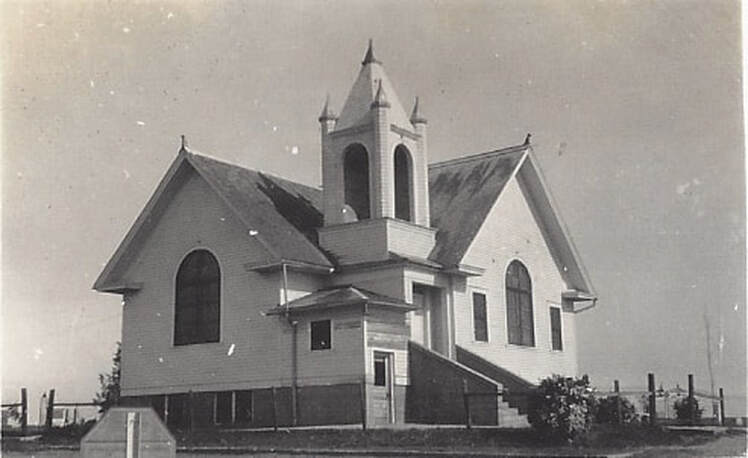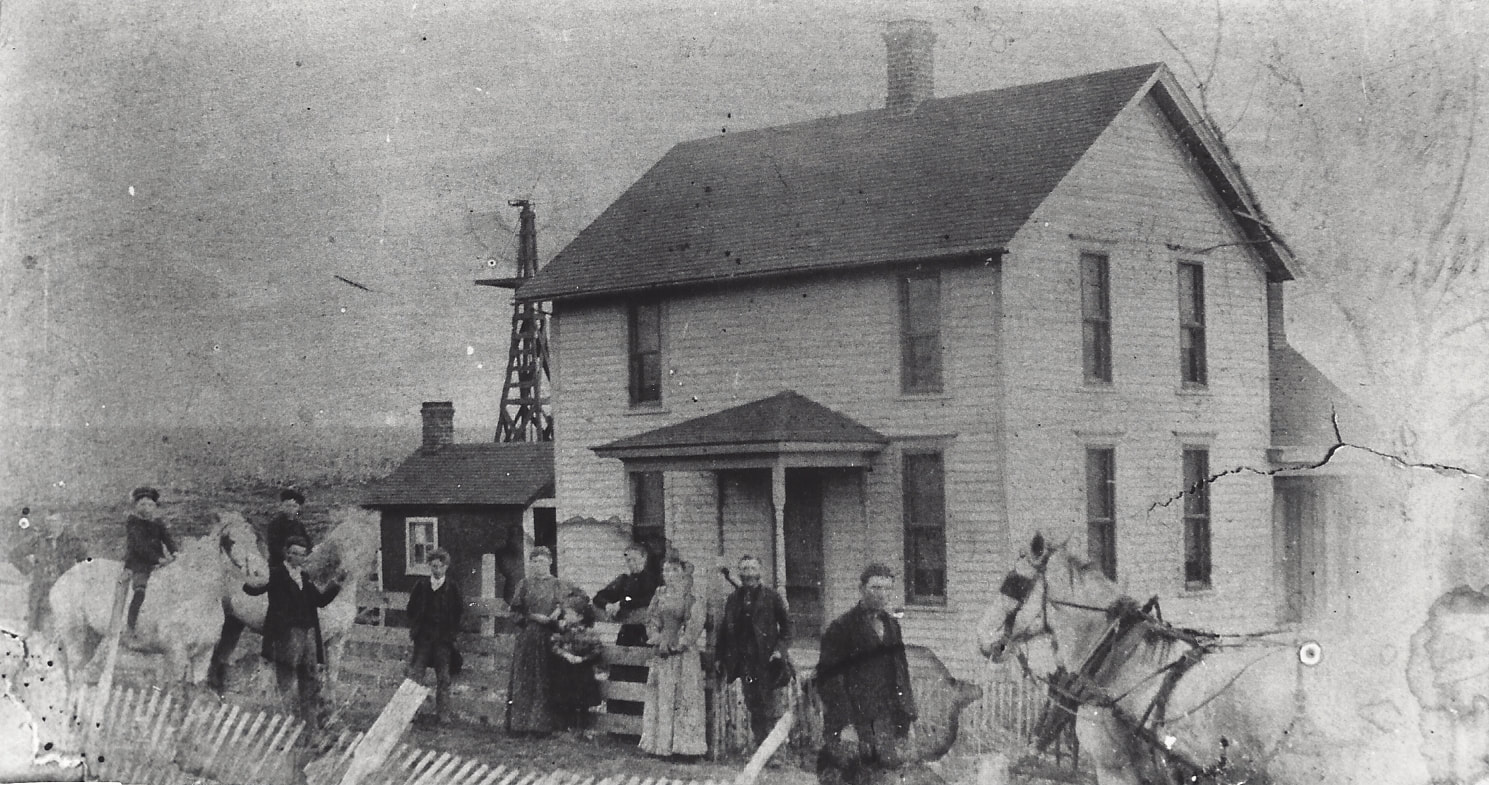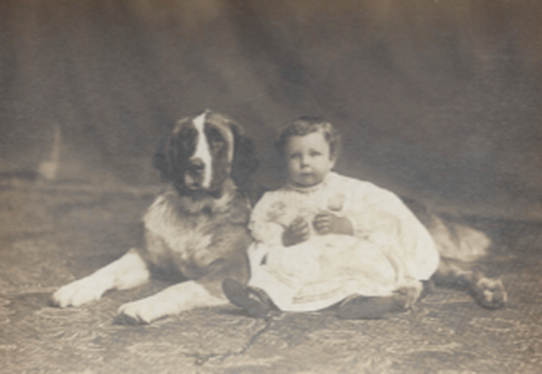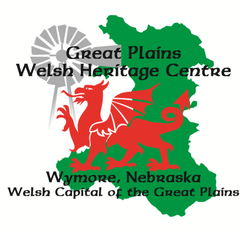About the great plains Welsh heritage Centre
The Great Plains Welsh Heritage Centre is the only cultural resource in the United States dedicated to interpreting the cultural legacy of Welsh immigrants on the Great Plains. We reveal this history as told by the settlers themselves through their own words, images and artifacts.
Come visit us in downtown Wymore where exhibits tell the story of immigration from Wales and the contributions of Welsh settlers to the development of the Great Plains region. The commemoration of our Welsh heritage continues outdoors with our mural titled “Wales to Nebraska” by David Loewenstein, and our memorial garden.
We host several events throughout the year to promote the Welsh-American heritage of Nebraska and the Great Plains. Check our events page or follow us on Facebook for information about gatherings, presentations and performances.
Adjoining our Heritage Centre is the Archive for Welsh America, home to a growing collection of documents, manuscripts and photographs related to Welsh-American history. We also provide archival space for several Welsh-American organizations.
Because we have access to primary sources written or published in the Welsh language, we may be able to assist with your genealogical or historical research. Using our microfilm and paper copies of the Welsh-American newspaper Y Drych (The Mirror), we can provide lookups of individuals who lived in Welsh communities across the United States and Canada during the 19th and 20th centuries. We are also able to provide some translations from Welsh to English. Our own research has revealed that Welsh immigrants often wrote more candidly in their own language, revealing more authentic accounts of their experiences as they lived them.
Come visit us in downtown Wymore where exhibits tell the story of immigration from Wales and the contributions of Welsh settlers to the development of the Great Plains region. The commemoration of our Welsh heritage continues outdoors with our mural titled “Wales to Nebraska” by David Loewenstein, and our memorial garden.
We host several events throughout the year to promote the Welsh-American heritage of Nebraska and the Great Plains. Check our events page or follow us on Facebook for information about gatherings, presentations and performances.
Adjoining our Heritage Centre is the Archive for Welsh America, home to a growing collection of documents, manuscripts and photographs related to Welsh-American history. We also provide archival space for several Welsh-American organizations.
Because we have access to primary sources written or published in the Welsh language, we may be able to assist with your genealogical or historical research. Using our microfilm and paper copies of the Welsh-American newspaper Y Drych (The Mirror), we can provide lookups of individuals who lived in Welsh communities across the United States and Canada during the 19th and 20th centuries. We are also able to provide some translations from Welsh to English. Our own research has revealed that Welsh immigrants often wrote more candidly in their own language, revealing more authentic accounts of their experiences as they lived them.
The Great Plains Welsh Heritage Project (GPWHP) was established in September 2000, shortly after Lori McAlister interviewed Ellsworth Closs, a Wymore native and the only Welsh-speaking person still living in Gage County at that time. This oral history project inspired further research on Welsh settlements in the local area as well as throughout the state of Nebraska and the Great Plains region.
Local historians turned their attention to the Bethel Cemetery five miles south of Wymore, where the Bethel Welsh Church was built in 1879. Bethel became the hub for Welsh settlement in the area, which reminded immigrants of their homeland with its rolling prairies and the scenic Blue River. The settlement was located on both sides of what is now Highway 77, joining on the east with the Otoe Indian Reservation. To the north was the town of Blue Springs. These Welsh settlers, as well as German and Bohemian immigrants, were key figures in the history of the community.
Local historians turned their attention to the Bethel Cemetery five miles south of Wymore, where the Bethel Welsh Church was built in 1879. Bethel became the hub for Welsh settlement in the area, which reminded immigrants of their homeland with its rolling prairies and the scenic Blue River. The settlement was located on both sides of what is now Highway 77, joining on the east with the Otoe Indian Reservation. To the north was the town of Blue Springs. These Welsh settlers, as well as German and Bohemian immigrants, were key figures in the history of the community.
The town of Wymore did not come into existence until May 21, 1881, the date the plat was legally recorded by Sam Wymore. The Bethel Welsh Church remained in operation until 1960, when the remaining members made the difficult decision to demolish the building to prevent its abandonment and decay. The cemetery, however, it still lovingly tended by the descendants of the Welsh pioneers.
Raised in a Welsh-speaking home, Ellsworth Closs provided a link to these early Welsh settlers. His dedication to his Welsh-American heritage continued after his death on September 27, 2000. His family designated the GPWHP as the recipient of his memorial donations, which became the financial foundation of the project. We can never express to his family how much this has meant to us and he is honored at the Welsh Heritage Centre in Wymore.
Raised in a Welsh-speaking home, Ellsworth Closs provided a link to these early Welsh settlers. His dedication to his Welsh-American heritage continued after his death on September 27, 2000. His family designated the GPWHP as the recipient of his memorial donations, which became the financial foundation of the project. We can never express to his family how much this has meant to us and he is honored at the Welsh Heritage Centre in Wymore.
Since 2000 the GPWHP has undergone many changes and continues to grow in its activities and mission. Today, the GPWHP is a 501(c) (3) tax-exempt organization, and includes the Welsh Heritage Centre and Garden and the Archive for Welsh America, as well as the historic District 81 Schoolhouse and Burlington Park Railroad Museum, all located in Wymore. We are also active participants in many Welsh-American events and organizations nationally and internationally. Thanks to our dedicated board members, volunteers and of course, our generous donors, we continue to commemorate the contributions of Welsh Americans not only to the Great Plains Region but also to the United States and Canada.



